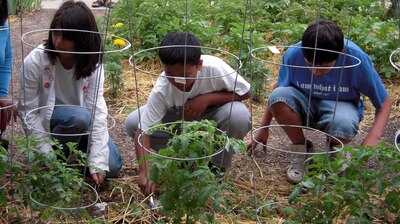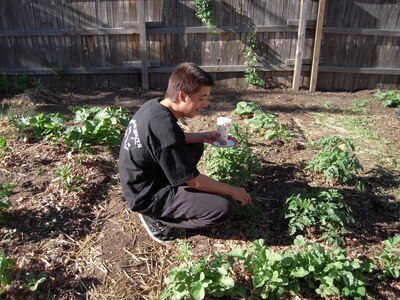
Many school gardens – such a hive of activity just a month ago – look dormant today, their early-season crops long ago harvested and their young gardeners now gone for summer break.
But look a bit below the surface, and you’ll see lots of things are happening. Some things are getting bigger and new things are taking root – and we’re not just talking about fruits and vegetables.
Around Colorado, the school garden movement continues to expand.
In the metro area, the partnership between Slow Food Denver and Denver Urban Gardens brought gardens and gardening and nutrition education to 45 schools this year. (Read more about Slow Food Denver in this EdNews Parent post.)
Two-thirds of the schools are in DPS but others are in Commerce City, Jeffco, Englewood, Cherry Creek, Aurora and a smattering of private schools. Even Graland Country Day School got a garden for its kindergarteners and first-graders.
And more are in the works, said Andy Nowak, director of Slow Food Denver.
Youth farmers markets expanding in Denver ‘food deserts’
Most importantly, Slow Food Denver and DUG recently won a grant from the U.S. Department of Agriculture to expand its Denver Youth Farmers Market Coalition, which will bring more fresh produce into neighborhoods identified as “food deserts,” those places where full-service grocery stores are not easily accessible for residents without transportation.
The grant will fund market stands, tents and tables and will pay stipends to garden leaders, as well as pay for chefs to come in and show students how to use the fresh produce.
“Our goal is to increase the availability of Colorado fresh fruits and vegetables into these neighborhoods,” said Nowak.
Last year, four schools in west Denver participated in youth farmers markets. At least 10 schools will be running them this summer, starting in August and going through October, he said.
Also due for expansion is the organization’s Seed to Table program, which saw school gardens producing food that could be consumed on site, in the school cafeteria.
“Last year, we did 14 such gardens, and the school district loved it. We’ve been asked to triple the program in size, so we’ll have more schools and more produce coming in from the schools,” Nowak said.
Professionals to farm acreage at two Denver schools
At two DPS schools, the “school gardens” will quite literally become the “school farms” this summer.
The district is set to enter into a groundbreaking contract with a professional farming company to transform nearly two acres of vacant land at McGlone Elementary in Montbello and at Bradley International School in southeast Denver into productive farmland growing crops that will feed DPS students.
The project has been in the works for nearly two years now as school officials worked out all the kinks.
“We’re finally at the stage where it will get off the ground,” said Leo Lesh, DPS director of food and nutrition services. “When you deal with public school grounds, there are certain things you have to do due diligence on – liability, what to do with any excess produce and things like that. But that’s all been worked through now, and we’re excited to get going.”
DPS will rent the land to TSR Group of Golden, more commonly known as Agriburbia. Agriburbia will send in professional farmers to tend the land and grow the crops DPS wants. Upon harvest, DPS will buy the food, which will go directly into the school cafeterias.
“It won’t be the end-all. I’ll still have to buy produce,” said Lesh, who spends about $3 million a year stocking fresh fruit and vegetables for DPS food programs. “And a lot depends on the weather. If Mother Nature plays tricks on us, we might not get as much as we hope. But if the stars align, we should be able to supply more of the vegetables for those two schools for August, September and October.”
Denver’s garden-to-farmlands experiment unique
Quint Redmond, owner of Agriburbia, acknowledges the two Denver gardens-to-farmland will be going in a little late this year and there’s still a bit of irrigation work that needs to be done before any crops are planted.
On districts growing food“We calculate how many calories are consumed by a school district, and we know how much land we’d need to grow that many calories. We track every tomato plant.”— Quint Redmond, Agriburbia
“But we’re not a single commodity farmer,” he said. “We plant and harvest continually, so we’ll be planting late season crops. We’ll plant some tomatoes, and if we have an Indian summer, we may be harvesting spinach at Thanksgiving.”
As far as anyone involved in the project can tell, this is a first-in-the-nation experiment with an urban school district actually growing its own food in a much more intentional way than the hit-or-miss approach of typical school gardens.
Redmond is convinced it’s possible for DPS and other school districts to home-grow a huge amount of their produce needs.
“We calculate how many calories are consumed by a school district, and we know how much land we’d need to grow that many calories,” he said. “We track every tomato plant.”
At present, locally-grown food barely makes a dent in most school district’s needs.
“A lot of districts try to buy local, but there simply isn’t enough locally-grown food,” Redmond said. “Even at farmers markets, during the core season, there’s some produce that’s actually from in-state, but most of the time it comes up from Arizona.”
Ultimately, Redmond is betting the school-as-farm-landlord model will become huge.
“We do the work, the school district owns the food. The really good thing is, the money for the food doesn’t have to leave the school district. We grow whatever they tell us. We custom farm. We’ve taken a vacant, empty lot and turned it into an asset. The private sector wins, people get jobs, and the district pays about the same for food as they would otherwise, but the food is twice to three times as good.”
Teachers head to the gardens in Boulder
In Boulder, the Growe Foundation partnered with Boulder Valley School District to develop 14 garden-to-table programs in various schools this spring. (Read more about last spring’s planting of school gardens in Boulder Valley).
Before school ended for the year, the gardens had harvested about 135 pounds of lettuce, which went into some 5,000 school salads, said Bryce Brown, executive director of the foundation.
During the summer, only a few of those gardens are actively being cultivated by summer school students. Otherwise, school and parent volunteers will quietly tend the gardens to keep them healthy and ready to go once students return in the fall, Brown said.
Instead of students, it’s teachers who will be spending time in some Boulder Valley school gardens this summer. Professional development workshops are planned in the gardens to help teachers learn ways to integrate gardening into their classroom curriculum. (Read more about how school gardens help students learn other academic subjects in this EdNews Parent post with fun planting video).
Special needs students digging in at Garden of Youth
In a tiny plot of land a stone’s throw from Denver’s North High School, three DPS special education students are spending the summer tending the DPS Garden of Youth.
The students are part of a summer internship program that provides special-needs teens with training in basic work skills and problem-solving. They also earn some money – minimum wage for 90 hours of work over the summer – and get credit toward graduation.

Most internships end at the end of June but the gardeners will be able to continue through summer growing season and into fall. In addition to working with master gardener Francie Bronner to learn how to tend a garden, they’ll also have the opportunity to sell some of their produce at the Highland United Neighborhoods farmers markets.
“There’s a sense of ownership and accomplishment already, even though they’re not really at the harvesting point yet,” said Monica Schultz, ACA Career Paths coordinator for DPS. “People often underestimate students with disabilities and what they can do.”
The garden plot was donated by the Gardens at St. Elizabeth, a senior living community a couple of blocks from North. Schultz plans to arrange for some inter-generational activities this summer as well, inviting St. Elizabeth residents to visit the garden and partner with the teens in some hands-on projects.
Nineteen-year-old Daniel Sainz, one of the teen gardeners, hasn’t done much gardening before but he likes the work of watering and weeding.
“I just like being outside, working with my hands,” he said. “If the plants get too hot, they’ll die, so I’m learning to take care of them. The jalapenos started looking like they would die, so I put some more mulch on them and now they’re doing good.
So far, the only thing the teens have harvested is radishes, and Daniel admits he hasn’t sampled them.
“I guess I should,” he said, reluctantly.
Classmate Angelica Garcia, 18, has been surprised by how persistent the bugs have been.
“You have to get down on your knees and take the bugs out one by one,” she said. “There are a lot of them.”
About our First Person series:
First Person is where Chalkbeat features personal essays by educators, students, parents, and others trying to improve public education. Read our submission guidelines here.
